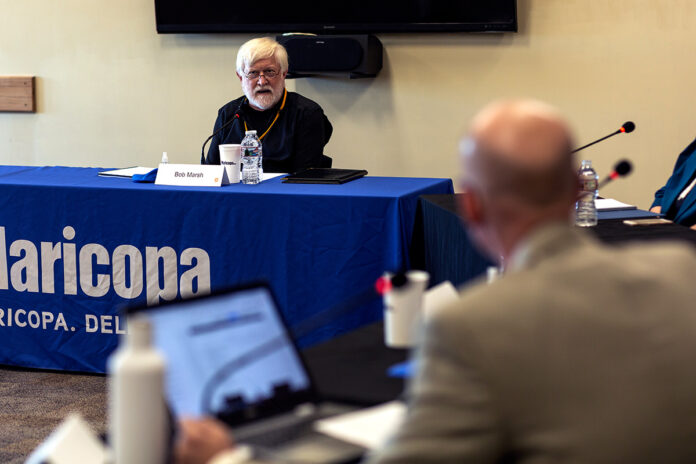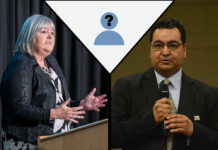
InMaricopa hosted its Town Hall for city council candidates July 9. The Facebook Live event generated lively and passionate responses from the audience and candidates alike.
We promised to follow-up on a couple topics discussed that required clarification. We also solicited direct feedback from viewers, and results of those discussions are included below.
MPD BODY WORN CAMERA POLICY
To clarify Maricopa Police Department’s operation of Body Worn Cameras (BWC), its policy states, “Manual activation is required to activate the BWC.”
The policy further states:
• Not all situations can be identified as to when officers should or should not record; therefore, an officer’s good judgment must always be used in addition to policy.
• Officer safety takes precedence over recording events and shall be the primary consideration when contacting citizens or conducting vehicle stops.
• All members assigned a BWC shall make every attempt to activate the device to record all contacts with citizens in the performance of their official duties (e.g., calls for service, traffic incidents, supervisors contacting citizens regarding complaints, etc.). Members shall also activate their BWC during emergency or pursuit driving situations, when practical. Officers are reminded to turn on the PDRD prior to arrival or start of contact (e.g., when observing a violation or upon arrival at a call) to record the event in its entirety. [41.3.8b]
• While working off-duty assignments, members who have been assigned a BWC shall wear and utilize the device in accordance with the provisions of this policy.
• Once activated, the recording shall not be intentionally terminated until the conclusion of the incident.
Recording exceptions are:
• Activating the PDRD in the midst of a dynamic event (e.g., pursuit will only be expected if/when it can be done safely.
• If during the course of an investigation an officer needs to meet with a supervisor or other officer to discuss investigatory strategies outside the presence of those citizens involved in the incident, the camera may be turned off. Prior to turning the camera off a comment should be recorded explaining that the camera will be turned off for this purpose. Once the discussion is complete and the officer is back with the citizen, the camera will be turned back on.
• Members shall not record confidential informants or undercover officers.
Click to see MPD’s Body Worn Cameras policy in its entirety.
LINETTE CAROSELLI PETITION SIGNATURES
InMaricopa asked candidate Linette Caroselli about the number of signatures she collected from voters to get on the ballot.
We said she collected a total of 223 signatures – eight more than the required minimum of 215 – but an unofficial examination indicated 77 were invalid. Therefore, we said, Caroselli was “potentially” 69 signatures short of the minimum required.
In response, Caroselli said InMaricopa was “misinformed” and “That’s an inaccurate statement. I highly disbelieve that 77 of my signatures were not valid.”
We checked our figures and confirmed she collected 223 signatures. A closer comparison of the Pinal County voter rolls and Caroselli’s petitions indicates 150 signatures appear to be valid. But 72 of the signatures appear to be invalid, with 60 from people not on the county voter rolls and 12 from people whose address on the petition did not match the address on the voter rolls.
The information from one signatory on the petitions could not be discerned.
By InMaricopa’s analysis, 32% of the signatures collected by Caroselli were invalid, which suggests she was 64 or 65 signatures short of the required minimum of 215.
Facts aside, we were accused of “attacking” this candidate and being racist by asking the question. For the record, the question was directed to the candidate who likely did not do the minimum required by law to get their name on the ballot. It would have been asked of any candidate regardless of their race.
We subsequently asked the other candidates whether they considered challenging Caroselli’s signatures, and none said they did. They all seemed to agree with Councilmember Gusse’s “the more the merrier” sentiment. (This begs the question which other city regulations and state statutes the candidates might disregard when elected.)
The irony is, if Caroselli gets elected, someone else won’t – and it will be because no one chose to hold her accountable.
GUSSE AD BUY
Our Facebook audience also inquired why a perceived difficult question was asked of Julia Gusse. Gusse was asked why she bought an InMaricopa ad with taxpayer money during election season that featured her name and picture after previously telling Mayor Christian Price about InMaricopa and me: “My recommendation is to NOT advertise one dime of our City’ advertising budget in this publication. … [I] will fight for the discontinued financial support of his organization.”
The question was relevant as it was one of many examples of Gusse’s situational ethics. The nature of running for reelection is incumbents have records; sometimes that helps them, sometimes it doesn’t.
TRUMP VS. BIDEN
The question of who the candidates intend to vote for President was a controversial one. It was asked to give candidates, to whom the question was previously posed in a survey for a piece in the July issue of InMaricopa magazine, another chance to come clean with the electorate. It was not intended to create a partisan divide, but to differentiate the candidates who are not afraid of standing up for what they believe, in this case a person or political ideology.
Of course, if someone wanted to announce Bernie, Kanye or anyone else, they would have been welcome to do so. We never judged anyone for how they answered questions that evening; we just asked the questions.
The controversy stemmed from the candidates’ responses. The three most liberal candidates refused to answer the question and the three most conservative candidates did. This fact is a reflection of those answering the question, not those asking it.
RACE
A hypothetical question asking whether a Black, Hispanic or White chamber of commerce – or all or none – is racist also drew the ire of many on Facebook and the candidates themselves. The question was poorly written, resulting in misinterpretation by candidates and subsequent discussion that differed from the intent. (See Lessons Learned below.)
QUESTIONS NOT ASKED
We got grief for questions we did not ask in addition to those we did. There are three primary reasons:
1. Me. I was responsible for navigating hundreds of comments and questions streaming in from Facebook while trying to assist my co-facilitator, Jim Chaston. And I did a poor job of it. (See Lessons Learned below.)
2. A Facebook Live function prevents viewers from commenting more than once per minute. For those of you who accused us of muting you, it wasn’t by design; you just had a lot to say.
3. We had many more questions than time to ask them. (See Lessons Learned below.) A special thanks to candidates Julia Gusse, Andre LaFond and Nancy Smith for addressing voter questions on the feed after the event.
LESSONS LEARNED
Given the very passionate opinions shared on Facebook, we scheduled two listening sessions in effort to bypass the unconstructive dialogue that can accompany social media and connect directly with our readers. We personally invited 15-plus people (the most “passionate” of the bunch) in addition to a blanket invitation to everyone on the Facebook Live discussion. Three candidates (Amber Liermann, Bob Marsh, Nancy Smith) and three community members (Elsie Larae, Kim Elaine Morris, Monica Smith) took us up on the offer.
Here are a few of the takeaways we plan to implement prior to the next Town Hall, and other lessons learned:
1. Add a person to the process of facilitating questions.
2. Tell audience upfront of their inability to comment more than once per minute.
3. Establish an Editorial Advisory Board of readers to help ensure our Editorial coverage – including Town Hall questions – addresses issues important to the community and does so in a way that is most conducive to productive conversation.
4. We could likely still accomplish our goal of unmasking how candidates think but do so focusing on more local concerns than national politics.
5. The sensitivity around the words “race” and “politics” is no different in Maricopa than what appears to exist in the rest of the country.
Maybe the greatest lesson is really a reminder – that we cannot please everyone, and we should not try. We are going to do our job – which includes asking tough questions – to the best of our ability, and we will strive to get better every day. Thanks to our candidates and critics, we accomplished both.

![Elena Trails releases home renderings An image of one of 56 elevation renderings submitted to Maricopa's planning department for the Elena Trails subdivison. The developer plans to construct 14 different floor plans, with four elevation styles per plan. [City of Maricopa]](https://www.inmaricopa.com/wp-content/uploads/2024/04/city-041724-elena-trails-rendering-218x150.jpg)
![Affordable apartments planned near ‘Restaurant Row’ A blue square highlights the area of the proposed affordable housing development and "Restaurant Row" sitting south of city hall and the Maricopa Police Department. Preliminary architectural drawings were not yet available. [City of Maricopa]](https://www.inmaricopa.com/wp-content/uploads/2024/04/041724-affordable-housing-project-restaurant-row-218x150.jpg)

![City looks to lower property taxes again City Manager Ben Bitter speaks during a Chamber of Commerce event at Global Water Resources on April 11, 2024. Bitter discussed the current state of economic development in Maricopa, as well as hinting at lowering property tax rates again. [Monica D. Spencer]](https://www.inmaricopa.com/wp-content/uploads/2024/04/spencer-041124-ben-bitter-chamber-property-taxes-web-218x150.jpg)











![Shred-A-Thon to take place tomorrow An image of shredded paper. [Pixabay]](https://www.inmaricopa.com/wp-content/uploads/2024/03/shredded-paper-168650_1280-100x70.jpg)
